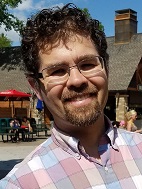
A Little About Me
I am a professor of mathematics at Minnesota State University Moorhead in Moorhead, MN. I have been married for nearly 15 years and I have two little boys who keep me on my toes every day. I did my undergraduate work at Adrian College and my Ph.D. in Combinatorics at Michigan State University. Sharing my love of mathematics makes my work easy and fun. I absolutely love teaching and talking about mathematics and its impact on the world.
My original mathematical love was combinatorics, and, while I'm still passionate about Combinatorics, I've discovered another passion for the history of mathematics and how it influences the world we live in. We all know that mathematics has impacted science and technology, which in turn impacts the culture we live in. Through my study of the history of mathematics I've discovered how the logical thinking and philosophy of mathematics has impacted politicians, sociologists and others, which has in turn shaped our world.
I invite you to explore the history of mathematics with me. In this course we will read about the development of mathematics from the very ancient through modern times. We will trace threads of thought over thousands of years and see how generations of passionate mathematicians solved problems that would impact the world beyond their wildest dreams.A Little More About the Course
In this course we will read A History of Mathematics (3rd Edition) by Uta C. Merzbach and Carl B. Boyer. We will discover how different cultures and societies influenced the development of mathematics and how ideas were shared and spread into the modern world. The course is broken into five units each covering a couple of chapters from the book and each dealing with a different time period, a different culture, or a different mathematical development.
For each unit you will read about 15 pages per day and take a reading quiz testing your retention of the concepts you were reading. In addition, for each unit you will be required to complete two mini-projects and write a short paper describing the life of a person that was discussed in that unit or an important mathematical development from that unit. The mini-projects consist of mathematical constructions or questions that will prompt you to write and think more deeply about why a development or event was important. Finally, there will be discussion boards in each unit, where you will be expected to discuss the concepts you are reading about with your peers.
The final assignment will be a longer paper, where you will be expected to take a modern mathematical topic that interests you and think about its origins. You will write about all of the people and mathematical developments that contributed to the development of this modern topic. As an example, you might find imaginary numbers fascinating. You might trace these back through developments in algebra, symbolic representations, and trigonometry, etc.
The entire course will take place on the D2L platform. To find more specific information including a detailed syllabus, please log-in to D2L.
